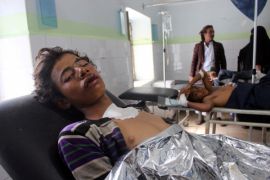Warplanes of Yemen`s air force carried out intensified air strikes against various strongholds of the al-Qaida militants in Azzan and Rowda towns in Shabwa province late Friday night, killing the media chief for AQAP`s group along with 23 other terrorists, including the son of Anwar al-Awlaki, the local military official told Xinhua, who asked to remain anonymous.
Al-Banna was in charge of media affairs of the terrorist group.
Earlier the day, the country`s defense ministry said in a brief statement posted on its web page that al-Banna was killed in the air strike in Azzan town along with six terrorists, adding that he was wanted "locally and internationally for planning terrorist attacks both inside and outside Yemen."
The military official said the raids also killed Abdul Rahman Anwar al-Awlaki, the 21-year-old son of slain U.S.-born cleric Anwar al-Awlaki, who was killed by U.S. drone on Sept. 30 in northeastern areas between Marib and al-Jouf provinces.
Anwar Al-Awlaki, born in New Mexico to Yemeni parents, began as a mosque preacher when he conducted his university studies in the United States, and he returned to Yemen in 2004.
He was branded as a major recruiter for al-Qaida, and U.S. officials suspected him of providing spiritual guidance to attackers who carried out Fort Hood shooting in November 2009 and the underwear bomb attempt on a U.S. airliner the following month.
Al-Awlaki`s son is one of al-Qaida operatives in Abyan and Shabwa provinces, he said.
Suspected al-Qaida militants later carried out a retaliatory attack and bombed a key, underground gas pipeline passing in Shabwa province that extends gas from Marib province to an exporting port on the Arabian Sea, according to local security officials.
AQAP militants are apparently taking advantage of the country`s nearly nine months of political turmoil in expanding their military operations and control in the lawless southern and eastern parts of the country.
Observers fear that, with continuous domestic conflict and bloodshed, the country may follow the steps of Libya and eventually slide into civil war, an ending that would benefit al- Qaida. (*)
Editor: Kunto Wibisono
Copyright © ANTARA 2011










